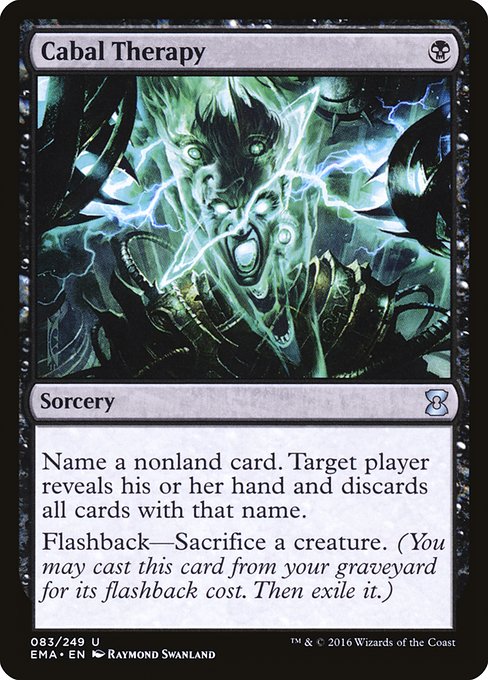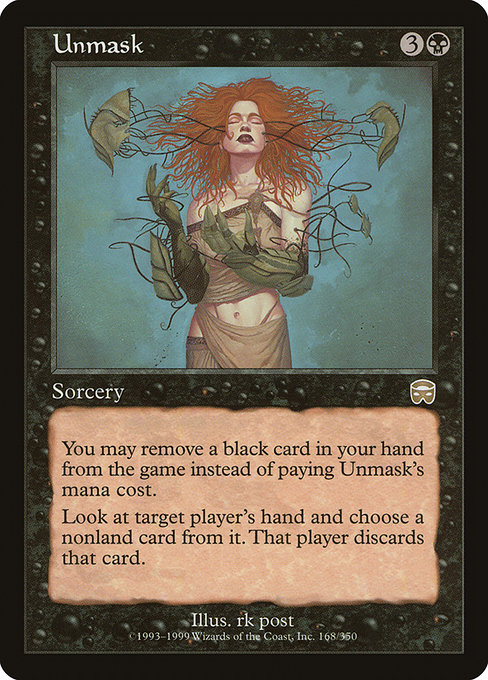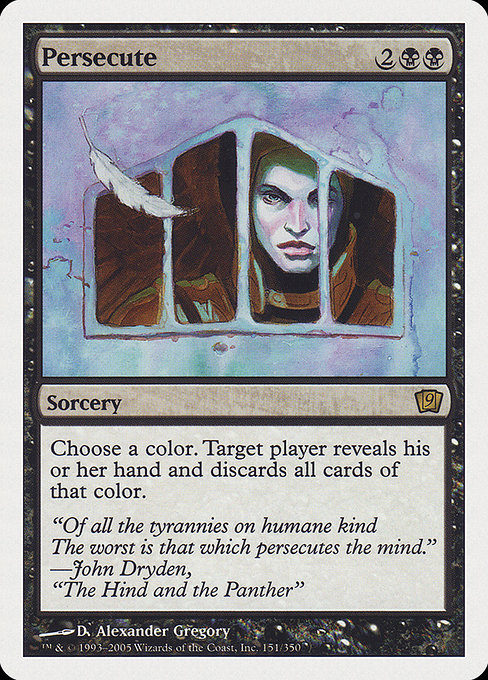I recently started playing Premodern. If you’re not familiar, it’s a 60 card constructed format using the card pool from 4th Edition through Scourge. This span covers lots of busted cards. Some of the most fun and most unusual and forgotten cards in Magic’s history. Zur’s Weirding, anyone? Astral Slide? But the one I’m here to talk about today is Cabal Therapy.

I’ve perhaps stirred the hornet’s nest with my title, but I don’t care. I am slowly coming around to the idea that, objectively, Cabal Therapy is a banger anywhere. And why? Well, it’s a sorcery that costs one black mana and reads:
Choose a nonland card name. Target player reveals their hand and discards all cards with that name.
Flashback—Sacrifice a creature. (You may cast this card from your graveyard for its flashback cost. Then exile it.)
It’s a better Thoughtseize. Moreover, where all other discard spells are easy or gimmes, Cabal Therapy forces you to pay attention to an opponent’s strategy or hand. Yes, there are methods around this by, say, playing Duress turn one and then hitting them with a Cabal turn two to clean up what you couldn’t get before. In Premodern, it’s kind of agreed on, I think, that the best white and black cards are Swords to Plowshares and Cabal Therapy. I would agree.
I think it’s a nearly perfect card. A nearly perfect black card. Why? Usually, the go-to spice of black cards is to pay life as a resource. Like Thoughtseize, for example. But the Flashback mechanic here–sacrifice a creature as the cost–is thematically perfect. You can really tear up a hand in Premodern if you’re on the play with black by, say, turn one Dark Ritual into Cabal Therapy, then playing a two-drop creature, say, Ravenous Rats (making them discard a card), and then flashback Cabal and sac Rats, then Unmask paying the alt cost of discarding a black card. If you name a hit with Cabal, you potentially destroy their starting hand. Yes, you’d be at two, but black doesn’t concern itself with card advantage.

In lore, the Cabal was a group of wizards in Otaria on Dominaria that worshipped money, greed, and profit. A Cabal Therapy, then, would be one that encouraged you to indulge in this soul-sucking triad. And in the card art, the “therapist” is rearranging the victim’s brain for a better outcome. One that favors endless greed and want. In the same way that the motto “Greatness, at any cost” has become standard for black, we might not see sacrifice as a source of power. But, again, the Cabal prayed to money, basically. Everything was up for sale. Up for grabs, to be given away in favor of something better, something shiny, something valuable. And what if that valuable thing is a Phyrexian Dreadnought or a Gush?
The word “cabal” comes from “Kabbalah,” the ancient Jewish branch of biblical mysticism, which in turn comes from a Hebrew word qibbēl, meaning “receive, accept.” How odd. That Cabal Therapy, in its deepest etymological roots, have the opposite meaning of what it does today. There is no receiving or accepting in any transactional way. The card is a demand. Moreover, what I love about it is how ludologically old it is. The idea of “naming” a card in an opponent’s hand and then getting to keep or discard those cards you correctly guessed goes back to childhood games like Old Maid. Which, in turn, is one of many types of “shedding games,” where the goal is to put down pairs of cards and empty your hand.

Cabal Therapy is the best black card because it is thematically on point, perfectly costed, seismic in its ability with flashback, and can be run as a four-of in Premodern. Moreover, the naming of a nonland card is always ripe with trepidation when you’re faced with a deck that you’re totally in the dark about. But that’s the risk and the reward. Lastly, I have a suggestion on what card to name when you’re not sure what you’re facing. A card that you can always go with and feel confident naming: Swords to Plowshares. When in doubt, name a Swords.
Kyle Winkler (he/him) is a teacher and fiction writer. While he was pre-teen when Magic: The Gathering was released, he didn’t start playing until recently. He’s the author of the cosmic horror novella (The Nothing That Is), a collection of short stories (OH PAIN), and a novel (Boris Says the Words). His favorite card is a toss up between Crypt Rats and Oubliette.

